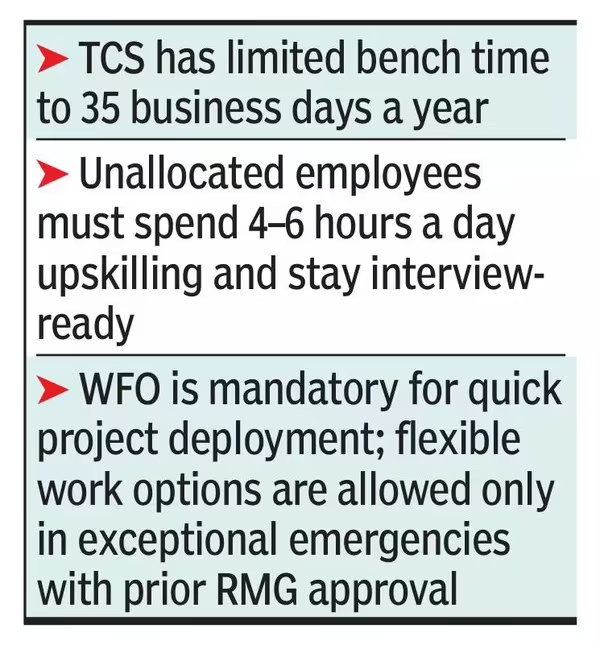
TCS New Bench Policy of 35 days, Employees May Face Termination
TCS New Bench Policy: Tata Consultancy Services (TCS), India’s leading IT services giant, has rolled out a transformative TCS deployment policy in 2025, effective from June 12. This policy mandates employees to achieve a minimum of 225 billing days annually while capping bench time at just 35 days per year. Designed to boost workforce productivity and align individual performance with organizational goals, this update has sparked discussions across the IT industry.
Understanding the TCS Deployment Policy 2025
The TCS deployment policy 2025 is a strategic move to enhance resource utilization amid a challenging IT market. In the IT sector, billing days refer to the time an employee spends on client projects, directly contributing to revenue. Conversely, bench time is when an employee is unallocated, awaiting assignment to a project. By mandating 225 billing days, TCS ensures employees are engaged in billable work for most of the year, limiting idle periods to a maximum of 35 business days.
This policy, outlined by Chandrasekaran Ramkumar, Global Head of TCS’s Resource Management Group (RMG), emphasizes proactive employee engagement. Associates must actively seek project allocations, upskill during unallocated periods, and adhere to strict work-from-office (WFO) mandates. Non-compliance could impact compensation, career growth, overseas opportunities, and even job continuity.
Key Features of the TCS New Bench Policy
- Mandatory 225 Billing Days: Employees must be allocated to client projects for at least 225 business days within a 12-month period. This translates to roughly 86% of the year spent on billable tasks, aligning with TCS’s goal of maximizing productivity.
- Bench Time Capped at 35 Days: The TCS bench policy restricts unallocated time to 35 days annually. Prolonged bench periods could lead to HR investigations, disciplinary actions, or even termination, making it critical for employees to secure projects swiftly.
- Mandatory Upskilling: Unallocated associates are required to dedicate 4-6 hours daily to skill development using platforms like iEvolve, Fresco Play, VLS, and LinkedIn Learning. TCS also encourages the use of its Gen AI interview coach to stay interview-ready.
- Work-from-Office Mandate: To facilitate faster project deployment, WFO is now compulsory for unallocated employees. Flexible work arrangements are permitted only in exceptional cases, such as personal emergencies, with prior RMG approval.
- Discouraging Short-Term Allocations: Frequent shifts between short-term projects are frowned upon and may trigger HR scrutiny, ensuring stable and meaningful project engagements.
Secure Your MNC Dream Job | Enroll in Our Exclusive Placement-Ready Courses Today! – Buy Now!
Implications for TCS Employees
The TCS deployment policy introduces a high-pressure environment where employees must take ownership of their project allocations. For freshers, the policy is particularly stringent, expecting project assignments from day one. Failure to meet the 225 billing days requirement could result in reduced pay, stalled promotions, and limited overseas opportunities. This shift places the onus on employees to proactively engage with RMG and internal job platforms to secure assignments.
The mandatory upskilling requirement is a double-edged sword. While it ensures employees remain competitive in a rapidly evolving IT landscape, the 4-6 hours daily commitment during bench periods can be demanding. Additionally, the WFO mandate may reduce flexibility, impacting work-life balance for some associates.

Why TCS Introduced the 225 Billing Days Policy
The IT industry is grappling with sluggish growth due to macroeconomic uncertainties, prompting companies like TCS to optimize operational efficiency. By capping bench time at 35 days, TCS aims to reduce idle resources, improve profit margins, and maintain its competitive edge. The policy aligns with industry trends, as other IT giants like Infosys and Wipro have also reduced bench periods to 35-45 days, down from 45-60 days in previous years.
This TCS new bench policy reflects a broader shift toward a leaner, project-specific workforce. With AI-led disruptions and slower deal closures, TCS is prioritizing agility and accountability, ensuring employees contribute consistently to client projects.
How Employees Can Adapt to the TCS Deployment Policy
To thrive under the TCS deployment policy 2025, employees must adopt a proactive mindset. Here are some strategies:
- Engage with RMG Early: Reach out to unit or regional RMG teams immediately upon release to the bench to explore project opportunities.
- Leverage Upskilling Platforms: Utilize iEvolve, Fresco Play, and LinkedIn to enhance skills, ensuring readiness for diverse projects.
- Use Gen AI Tools: Practice with TCS’s Gen AI interview coach to address feedback and excel in project interviews.
- Network Internally: Build connections within TCS to stay informed about upcoming projects and openings.
- Comply with WFO Rules: Adhere to the work-from-office mandate to demonstrate commitment and availability.
Also Read:Vonage Off Campus Direct Hiring For IT Services Technician – Apply Now
Industry-Wide Impact of the TCS Bench Policy
The TCS new bench policy sets a precedent for the IT sector, signaling a move toward stricter resource management. As competitors adopt similar measures, employees across the industry may face increased pressure to remain billable. This could drive a culture of continuous learning and adaptability, but it may also raise concerns about employee well-being and job security.
The TCS deployment policy 2025, with its 225 billing days mandate and 35-day bench time cap, is a bold step toward optimizing workforce efficiency. While it offers opportunities for skill development and career growth, it demands greater accountability from employees. By embracing proactive engagement, upskilling, and compliance with WFO rules, TCS associates can navigate this policy successfully. As the IT industry evolves, such policies may become the norm, reshaping how professionals approach their careers in tech.


